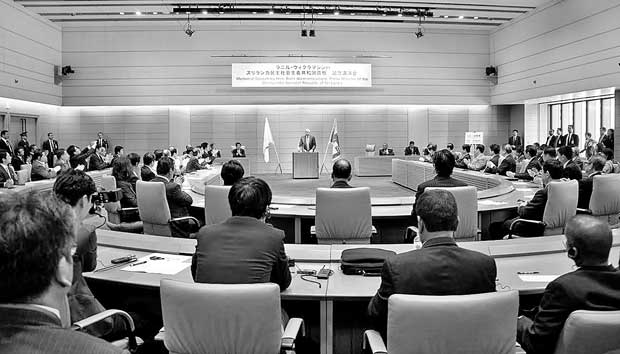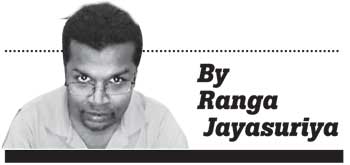Reply To:
Name - Reply Comment
.jpg) fter decades of foreign policy miscalculations, many of which were deliberate ideological fallacies committed to boost the over-sized images of local political leaders, we finally seem to be getting onto the right side, at the right time.
fter decades of foreign policy miscalculations, many of which were deliberate ideological fallacies committed to boost the over-sized images of local political leaders, we finally seem to be getting onto the right side, at the right time.
One way to gauge an emerging rapport between the States is to observe how respective leaders are treated by their counterparts.
On that account, even by the standards of our historically-good bilateral relationship with Japan, the reception Prime Minister Ranil Wickremesinghe received was a bit above average. He addressed the Japanese Parliament; only the third world leader to do so after Obama and Modi. During his stay, his Japanese counterpart met him on multiple occasions; perhaps his grand uncle, former President JR Jayewardene’s speech at the San Francisco Peace Conference -- in which he urged the world powers to disclaim war reparation from Japan -- could have elevated the PM’s stature. However, all that also highlighted the importance placed on the bilateral relationship by the Abe administration. Of course the PM did not return with any new development projects (The Japanese assistance for the expansion of the Katunayake International Airport and a new bridge over the Kelani river were agreed during the MR regime). However, the joint declaration referred to Japanese assistance to build “quality infrastructure, a Western region Megapolis and an urban metro, among others.
.jpg)
In New York, President Maithripala Sirisena sat on President Obama’s table when the US President hosted a lunch for the visiting global leaders. All others in the table, except Ukrainian President Petro Poroshenko, a Western ally besieged by the Russian backed rebels, were international big shots.
Also, at a session on Global Peace Operations Initiative (GPOI), the US President, after concluding his speech, walked up to the Sri Lankan delegation and shook hands with President Sirisena. Since we are a small fish in a big pond with sharks, such small gestures signify that we have been taken seriously. (Local pundits who ridiculed MS’s earlier remarks -- that the queen shook hands with him without gloves and David Cameron walked up to his car to receive him -- could well call them slavish thinking. However, those critics are the same folks who were not long ago awed by Libyan dictator Gaddafi’s buxom bodyguards).
Also our most important bilateral relationship with our neighbour India is at its best. Soon after the election of President Sirisena, Modi visited Colombo in the first bilateral visit by an Indian leader since 1987.
These three countries represent an emerging Asian democratic umbrella, under which countries like ours, which share common values of democracy can pursue prosperity. In fact, it was Shinzo Abe, the Japanese Premier in his earlier term in 2006, who proposed a democratic quadrangle, involving Australia, India, Indonesia and Japan.

If the new administration chooses to forge ahead with even a tacit alignment with the West and India, this is the opportune moment. Following are some reasons, that would garner extra weight to a small country like ours, situated in a strategic location in the Indian Ocean.
First: The United States has launched a pivot to Asia Pacific, later renamed as ‘re-balancing’ to hedge against the rising China and to reassert the US geo-strategic commitments to the allies in the region. The main commercial element of this multi-dimensional strategy, a free trade deal involving 12 regional countries -- Trans Pacific Partnership -- was agreed last week. When the pivot was first announced, then US Defence Secretary Leon Panetta described India as the ‘lynchpin’ of the US strategy. The then Congress administration in New Delhi, hamstrung by its internal differences, politely refused. However since his assent to power, Prime Minister Modi has enthusiastically vied the Americans. An emerging grand US-Indian partnership, which Obama has described as the most defining partnership of the 21st century is no longer a secret. In this context, if Sri Lanka chooses to play its cards well, we can find a place in this emerging grouping, at least as a tacit member, which is a more convenient prospect since the Sri Lankan foreign policy is perennially handicapped by the ideological dogmas of non-alignment. A place in such a grouping would provide us with opportunity to develop our infrastructure and lobby for trade and investment by connecting to a larger Indo-Pacific community.
Second, in international politics, states pay careful attention to the distribution of power and make adjustments, accordingly. In practice, States balance more often against threat, than power. China’s meteoric rise is altering the distribution of power in the international system. Countries in the neighbourhood are more likely to feel threatened by a rising power. Therefore, China’s rise is a matter of concern both for the USA, the reigning hegemon and China’s immediate neighbour Japan; concerns of the latter have been aggravated by the increasing aggressive posture of Beijing over the disputed islands in South China and East China seas.
Abe, the nationalist Japanese Premier, a controversial figure in his own right with his revisionist narrative of Japan’s war time record, has been manoeuvering to balance against the rising China. An enthusiastic partner of the US pivot, Abe visited India soon after Modi’s elevation to Prime Minister and stopped in Colombo as well.
In Tokyo, issuing a joint declaration on the comprehensive partnership between Japan and Sri Lanka, the PM and his Japanese counterpart ‘reaffirmed the importance of the freedom of navigation and overflight of the high seas, civil aviation safety, unimpeded lawful commerce, and peaceful settlement of disputes in accordance with the principles of international law.’ This oft-cited reference, which now makes regular appearance in the US and Japanese pronouncements is a rebuke to China’s posture in the dispute over the islands and Beijing’s unilateral declaration of an Air Identification Zone.
Both the Japanese and Chinese have deep pockets, however, unlike the Middle Kingdom, which is still (and for a long time to come) a middle income country, Japan is a rich world democracy with superior technology.
Third: India has finally got its act together. For four decades, India, a major non-Warsaw bloc ally of the Soviet Union, deprived South Asia of any significant partnership with the West. The JR administration which tried to break that mould and to journey the route that was taken by the South East Asian Tiger economies was brutalized by a paranoid and insecure India, weakened by its doomed statist economic policy. (JR himself weakened the momentum of the economic liberalization with his disastrous mishandling of anti-Tamil riots in 1983).
After slow starvation of its teeming millions and a world class balance of payment crisis in 1992, (and the collapse of the Soviet empire), India gradually  dismantled its licence Rajs and opened up. Still, its aversion to the outside influence in South Asia, gave little reason for the Western powers to adequately engage in the region, especially in the absence of a super power rivalry. The Modi-administration’s enthusiasm with Washington emanates, partly, from the understanding that India had missed the bus long ago. Today, the Indian economy is only one fourths of China’s and uneven economic growth and resultant distribution of power viz a viz China has left India with little choice, other than aligning with the US in order to increase its capability. India first learnt the myth of its strategic autonomy when its forces were trounced in a border war in 1962 by China, which by then was still recovering from Mao’s great famine, courtesy the Utopian communist experiment of Great Leap Forward.
dismantled its licence Rajs and opened up. Still, its aversion to the outside influence in South Asia, gave little reason for the Western powers to adequately engage in the region, especially in the absence of a super power rivalry. The Modi-administration’s enthusiasm with Washington emanates, partly, from the understanding that India had missed the bus long ago. Today, the Indian economy is only one fourths of China’s and uneven economic growth and resultant distribution of power viz a viz China has left India with little choice, other than aligning with the US in order to increase its capability. India first learnt the myth of its strategic autonomy when its forces were trounced in a border war in 1962 by China, which by then was still recovering from Mao’s great famine, courtesy the Utopian communist experiment of Great Leap Forward.
India no longer harbours the traditional reluctance to be seen with the USA. Its threat perception has shifted from the USA to China, which has resulted in a greater convergence of Indo-US strategic interests. New Delhi is comfortable with a world order shaped by the USA, than one dominated by China. And, as far as Sri Lanka is concerned, India has, finally, ceased to be a handicap for us in choosing our friends (perhaps, save China).
Fourth: The recent history of international politics would reveal that countries, ranging from South Korea, Taiwan, Singapore to Chile that joined such grouping at defining moments in international history have, in fact, benefitted from such partnerships.
Why our leaders failed to capitalize on those opportunities is that they placed their moralistic and ideological reasoning above long term interests of their people. In counter factual thinking, Sri Lanka could well have been positively a different country if Sir John Kotalawela won the 1956 election, instead of S.W.R.D. Bandaranaike.